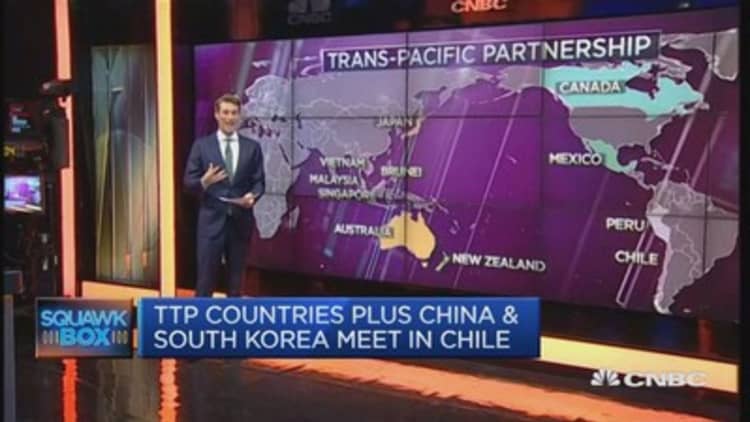
China and South Korea will be joining trade talks with member states of the now-scuttled Trans-Pacific Partnership (TPP) this week, raising fears that Beijing may dominate the meeting as it looks to benefit from Washington's absence.
Neither South Korea nor China are TPP members, but they are expected to focus on broad Asia-Pacific trade integration at the two-day event in Chile beginning Tuesday. Discussions there are expected to have a three-fold focus: the possibility of a TPP agreement without the U.S., the Regional Comprehensive Economic Partnership (RCEP) and the Free Trade Area for the Asia-Pacific (FTAAP).
China has stressed that its participation in Chile is strictly focused on Asia-Pacific co-operation, not joining the TPP. The Chile meeting is not an TPP meeting, Chinese foreign ministry spokeswoman Hua Chunying insisted on Monday, according to local media reports. Beijing, in fact, has never explicitly said it wanted to enter TPP talks, having previously called the entire deal too complex.
Still, the mainland is looking to gain more economic partnerships and fill up a predicted American vacuum in global trade.
President Donald Trump's exit from the TPP had disappointed many Asian members, for whom the deal represented profitable exports and imports in an environment of slow global growth. In response to Trump's policies, Beijing has repeatedly promoted itself as a champion of free trade.
China won't be taking the lead on the Chile talks, Deborah Kay Elms, executive director at Asian Trade Centre, told CNBC. "The onus is on the current members, particularly Japan, to decide if they want to continue promoting the gold standard agreement or consign it to the dust bin."
Alternative deals
If the Chile talks concentrate on RCEP instead of the TPP, that could actually speed up trade integration, Rajiv Biswas, Asia-Pacific chief economist at IHS Markit, said in a recent note, deeming RCEP a less complicated than TPP.
At least two TPP member countries, Chile and Peru, have also expressed interest in joining RCEP talks.
But if the 11 existing TPP members — Japan, Malaysia, Vietnam, Singapore, Brunei, Australia, New Zealand, Canada, Mexico, Chile and Peru — were to go ahead with the ambitious pact, that would require more time-intensive talks, Biswas noted.
"The original TPP deal required the ratification of TPP members comprising at least 85 percent of the GDP of the entire TPP grouping. Therefore, without the U.S., a new version of the TPP agreement would be needed."
A focus on RCEP would also work out in Beijing's favor; the mainland has long preferred the alternative deal over TPP.
"The US withdrawal from the TPP will help to strengthen China's economic leadership position in the Asia Pacific with its key role as a member of trade negotiations on RCEP and the FTAAP," said Biswas.

